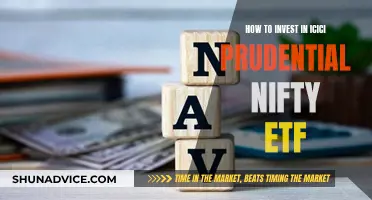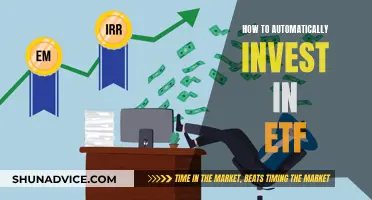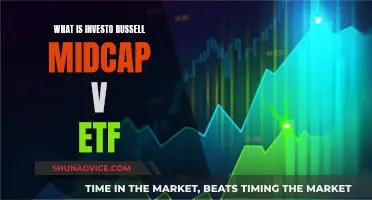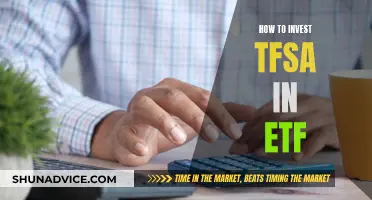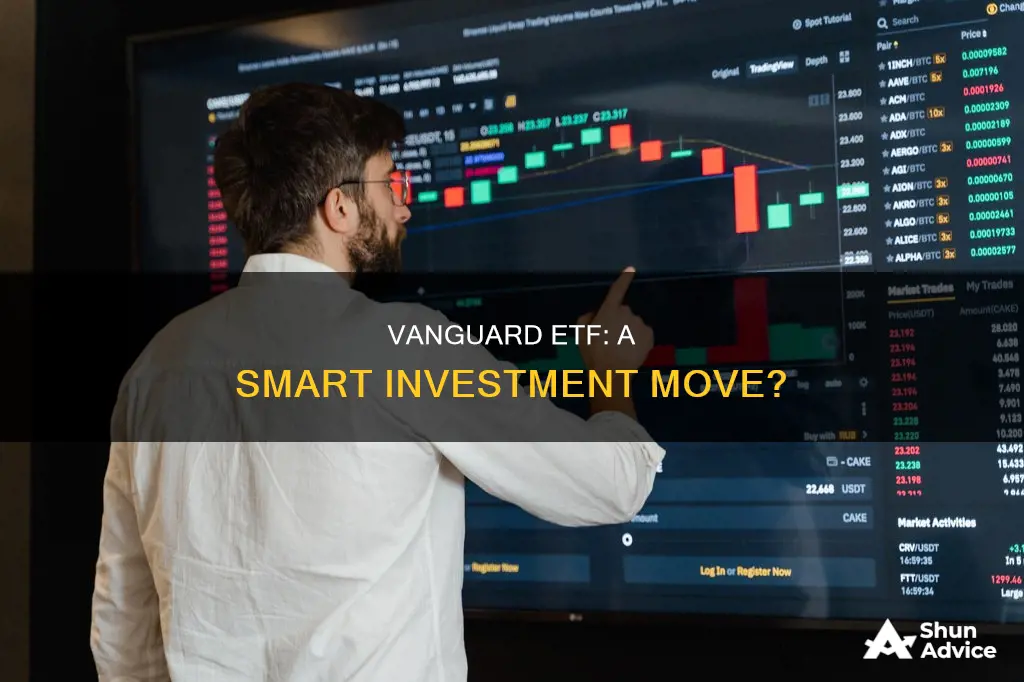
Exchange-traded funds (ETFs) are a popular investment option due to their low expense ratios, instant diversification, and low investment minimums. Vanguard, a well-known asset management company, offers a wide range of ETFs, including sector-specific and broad market options. Vanguard's ETFs have consistently outperformed their peers, with 88% of them beating peer-group averages over the past 10 years.
Vanguard's ETFs provide investors with a convenient way to diversify their portfolios and benefit from competitive returns. With a minimum investment of just $1, investors can access a diverse range of assets, including stocks, bonds, and other securities, all managed by experts.
To invest in Vanguard ETFs, individuals need to open a Vanguard Brokerage Account, either directly with Vanguard or through another broker. This account allows investors to buy and sell Vanguard ETFs commission-free online, providing an accessible and cost-effective way to build a well-diversified portfolio.
Vanguard's strong reputation, low fees, and broad range of investment options make it a compelling choice for individuals considering ETFs as part of their investment strategy.
| Characteristics | Values |
|---|---|
| Investment minimum | $1 |
| Investment types | General investing, retirement, higher-education savings |
| Brokerage | Vanguard Brokerage Account |
| Commission | Commission-free online |
| Management | Professional management |
| Dividends | Dividend reinvestment |
| Investment | Automatic investment |
| Price | $1 for Vanguard ETFs; market price for all other ETFs |
| Risk | All investing is subject to risk, including the possible loss of the money you invest |
What You'll Learn

What is a Vanguard ETF?
A Vanguard ETF, or exchange-traded fund, is a fund that groups assets such as stocks or bonds into one investment. By investing in a Vanguard ETF, investors can instantly diversify their portfolios. Vanguard, as the provider, owns the underlying assets and creates a fund that tracks their performance. The provider then sells shares in that fund to investors.
Shareholders own a portion of a Vanguard ETF but do not own the actual assets in the fund. Buyers and sellers trade the ETF throughout the day on an exchange, much like a stock. Vanguard ETFs combine the diversification of mutual funds with real-time pricing and an investment minimum of just $1.
Vanguard has over 80 ETFs to choose from, including broad ETFs that span entire asset classes and sector-specific ETFs. Broad market ETFs include those that track the S&P 500, while sector-specific ETFs cover areas such as oil, commodities, and clean energy.
Vanguard ETFs are bought and sold commission-free online through Vanguard Brokerage Services. They can also be traded through another broker, who may charge commissions.
Barefoot Investing: Choosing the Right ETF
You may want to see also

How do you buy Vanguard ETFs?
To buy Vanguard ETFs, you need a Vanguard Brokerage Account. If you already have a Vanguard Brokerage Account, you can start investing right away, but you must pay for your trade within 2 business days of initiating it. You can enter the ETF trade path through the Buy & Sell page when you're logged in to your account. If you don't already have an account, you can open one online in about 10 minutes. You'll need some information to hand, such as your Social Security and bank account numbers.
For newly opened brokerage accounts, you must have money in your settlement fund before you can buy an ETF. You can electronically transfer money into your settlement fund. Fractional investing allows you to trade a Vanguard ETF for any dollar amount you choose, regardless of the ETF's share price.
Vanguard ETF Shares are traded through Vanguard Brokerage Services or through another broker. Vanguard offers commission-free online trades, but another broker may charge commissions.
Mid-Cap ETF IJH: A Smart Investment Move?
You may want to see also

What are the costs and fees involved?
When considering investing in Vanguard ETFs, it is important to understand the costs and fees involved. Here is an overview:
Account Service Fees
Vanguard charges an annual account service fee ranging from $15 to $25, depending on the type of account you own. However, there are ways to avoid these fees, such as signing up for electronic delivery (e-delivery) of account documents or meeting certain asset thresholds.
Commission Fees
Vanguard offers commission-free trades when you buy or sell ETFs online through their brokerage services. However, if you use another broker, they may charge commissions, and trades placed over the phone may also incur a broker-assisted commission.
Expense Ratios
Every ETF has an expense ratio, which covers portfolio management, administration, marketing, and distribution fees. Vanguard's average ETF expense ratio is significantly lower than the industry average. As of December 31, 2023, Vanguard's average ETF expense ratio was 0.05%, compared to the industry average of 0.22%.
Bid-Ask Spreads
The bid-ask spread is the difference between the highest price a buyer is willing to pay and the lowest price a seller is willing to accept for an ETF at a specific time. Vanguard's bid-ask spreads typically range from $0.01 to $0.25 but may be wider in volatile markets.
Minimum Investment
Vanguard ETFs have a low minimum investment requirement, allowing investors to buy a Vanguard ETF for as little as $1 through their fractional share program. This makes Vanguard ETFs accessible to a wide range of investors.
Other Costs
When buying or selling Vanguard ETF Shares, it is important to remember that they are subject to market volatility. You will pay or receive the current market price, which may differ from the net asset value. Additionally, all investing activities carry the risk of potential loss.
Cobalt ETF: A Smart Investment Strategy for the Future
You may want to see also

What are the risks of investing in Vanguard ETFs?
As with any investment, there are risks involved when investing in Vanguard ETFs. Here are some key risks to consider:
- Market Volatility: ETFs are subject to market volatility, and the value of your investment can fluctuate. When buying or selling a Vanguard ETF, you will pay or receive the current market price, which may be higher or lower than the net asset value.
- Expense Ratios: While Vanguard ETFs are known for having low expense ratios, it's important to consider this factor when comparing similar ETFs. The expense ratio represents the percentage of a fund's total assets used to cover operating expenses, and higher expense ratios can reduce overall returns.
- Trading Fees: Buying and selling Vanguard ETFs may incur trading fees, similar to stock trading. These fees can add up, especially with frequent trading, and impact your investment performance.
- Capital Gains Tax: In some cases, Vanguard ETFs may distribute capital gains to shareholders, creating a tax liability. Investors who reinvest these distributions will also incur additional brokerage fees.
- Volatility and Diversification: While ETFs offer diversification, it's important to understand the underlying risks. Some Vanguard ETFs focused on specific industries or sectors may be more volatile than broader market index ETFs.
- Liquidity Risk: ETFs with low liquidity can pose challenges when trying to exit an investment. Look for large spreads between the bid and ask prices as an indicator of potential liquidity issues.
- Inverse and Leveraged ETFs: Vanguard offers inverse and leveraged ETFs, which are considered riskier investments. These ETFs can decay in value over time, even as the underlying index thrives. Analysts generally caution against buying and holding these ETFs for the long term.
- Taxable Income Flexibility: Investing in individual stocks through an ETF can result in reduced flexibility when it comes to tax-loss harvesting. ETF investors may have limited control over when to realize losses to offset capital gains.
- Tracking Errors: Vanguard ETFs aim to track specific benchmarks, but there may be tracking errors, which can introduce hidden risks.
- Control Over Investments: Vanguard ETF investors do not have a say in the individual stocks included in the ETF's underlying index. This lack of control may be a concern for investors who want to avoid specific companies or industries for moral or other reasons.
A Beginner's Guide to Investing in Singapore's ETFs
You may want to see also

What are the benefits of investing in Vanguard ETFs?
Investing in Vanguard ETFs can be a great option for several reasons. Here are some of the key benefits:
Diversification
Vanguard ETFs offer instant diversification, meaning investors can reduce their risk by spreading their investments across a wide range of assets. Vanguard ETFs are funds that group various assets, such as stocks or bonds, into a single investment. By investing in an ETF, you gain exposure to a basket of securities rather than putting all your eggs in one basket. This diversification can help bolster your portfolio's performance and reduce the impact of any single asset's poor performance.
Low Costs
Vanguard is known for its low-cost investment options, and its ETFs are no exception. With average ETF expense ratios significantly below the industry average, Vanguard ETFs provide a cost-effective way to invest. Lower expense ratios mean more of your money goes towards your investments rather than fees.
Trading Flexibility
ETFs offer the ability to trade shares in real-time during the trading day. This flexibility is an advantage over mutual funds, which can only be bought and sold once per day at market close. With ETFs, you have the option to act quickly on market movements and take advantage of short-term trading opportunities.
Low Investment Minimums
Vanguard ETFs have a low investment minimum, often as little as $1. This makes them accessible to a wide range of investors, even those just starting with a small amount of capital. You can buy a fractional share of a Vanguard ETF for $1, allowing you to invest in a diversified portfolio of securities without needing a large sum of money.
Competitive Returns
Vanguard ETFs have a strong track record of performance. Over the past decade, the majority of Vanguard ETFs have beaten their peer-group averages in terms of returns. This competitive performance demonstrates the potential for solid returns by investing in Vanguard ETFs.
Tax Efficiency
ETFs can be more tax-efficient than other investment options. They generally incur fewer taxable events, such as capital gains distributions, which can help you keep more of your investment returns.
Broad Range of Options
Vanguard offers a broad selection of ETFs, including broad market ETFs that track major indices like the S&P 500, as well as sector-specific ETFs covering areas like oil, commodities, and clean energy. This variety allows you to tailor your investments to your specific goals and interests while still enjoying the benefits of the ETF structure.
Strong Company Reputation
Vanguard is a well-known and respected name in the investment world. The company is renowned for its cost-effectiveness, flexibility, transparency, and client-centric approach. This strong reputation can give investors confidence in the quality and reliability of their investment products.
Inverse ETFs: A Guide to Shorting the Market
You may want to see also
Frequently asked questions
Vanguard ETFs are funds that group assets, such as stocks or bonds, into one investment. By investing in a Vanguard ETF, investors can instantly diversify their portfolios. Vanguard ETFs are known for offering high-quality, low-cost options.
To invest in a Vanguard ETF, you'll need to have a Vanguard Brokerage Account. You can then enter the ETF trade path through the Buy & Sell page when logged in to your account.
ETFs offer diversification, low costs, and the ability to trade shares live during the trading day. You can also buy a fractional share of a Vanguard ETF for as little as $1.



